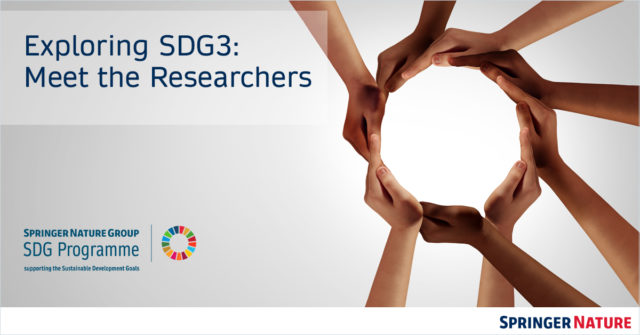
Welcome to our Meet the SDG3 researcher blog collection. We are interviewing a series of academics and practitioners working in diverse fields to achieve Sustainable Development Goal 3: Ensure healthy lives and promote well-being for all at all ages. You can find other posts in this collection here, and discover what else Springer Nature is doing to advance progress towards achieving this goal on our dedicated SDG3 hub.
Can you please tell us a bit more about yourself?
Tatenda Mawoyo

I am a qualified social worker, and I obtained a master’s degree in social policy and management from the University of Cape Town in 2011. I joined the Institute of Life Course Health and Research (ILCHR) in the Department of Global Health at Stellenbosch University in April 2020 as a junior researcher. Prior to joining ILCHR, I worked in the field of trauma counselling and youth development.
My areas of interest include adolescent mental health, parental skills, and sexual and reproductive health. Soon, I will be working towards a PhD focused on the role of school climate in supporting adolescent mental health. My role in Project HASHTAG included overseeing the intervention implementation and coordinating the day-to-day research activities.
Stefani Du Toit

I am a researcher working at the Institute of Life Course Health Research in the Department of Global Health at Stellenbosch University. I obtained my master’s degree in Psychology from Stellenbosch in 2017. I am currently working towards a PhD in Public Health where I am exploring adolescent mental health in the context of adversity.
I took a keen interest in adolescent mental health after my experience managing a randomized controlled trial assessing the effectiveness of an intervention to reduce interpersonal violence and improve mental health amongst adolescents living in a low-resource community. My role in Project HASHTAG included developing intervention material for the project and assisting with overseeing the implementation of the intervention program.
Please give a brief overview of Project HASHTAG?
Project HASHTAG (Health Action in ScHool for a Thriving Adolescent Generation) is a multilevel school-based health improvement intervention aiming to promote school climate and positive mental health and prevent mental disorders. Project HASHTAG is linked to the WHO-UNICEF Helping Adolescents Thrive (HAT) initiative that aims to strengthen policies and programs for adolescent mental health. The project was delivered in Nepal and South Africa; however, this blog post will focus on the South African experience. In South Africa, Project HASHTAG was delivered in two schools in Khayelitsha, a large peri-urban settlement outside of Cape Town, South Africa, with very high levels of adversity and poverty.
Project HASHTAG combined two strategies: a whole-school approach and a classroom-based psychosocial intervention. The whole-school approach was called Thriving Environment in Schools (TES), which aimed to improve the school climate and raise awareness about mental health. TES targeted students, school staff, and parents/caregivers. Thriving Together (TT) was a classroom-based intervention, which was delivered to groups of Grade 8 students (13-14 years of age) over 6 weekly sessions. TT was delivered by trained and experienced program facilitators from the Khayelitsha area themselves. As a highly interactive program, TT covered a range of skills, including problem-solving, communication, assertiveness, emotional awareness, mental health literacy, and mindfulness.

How does your work relate to SDG3?
SDG3 aims to ensure healthy lives and promote well-being, which was a driving motivation for implementing Project HASHTAG. More specifically, Project HASHTAG falls under SDG 3.4, which aims to reduce mortality from non-communicable diseases and promote mental health by 2030. Approximately 90% of children and adolescents worldwide are living in low- and middle-income countries, and between 10-20% experience a mental health condition. Adolescents in Khayelitsha are at particular risk of poor mental health as they face a variety of risk factors associated with low socioeconomic status, including exposure to violence and household economic fragility.
The COVID-19 pandemic also had a significant impact on the mental health of adolescents. Ongoing isolation, school closures, economic uncertainty, bereavement, and loss negatively impacted schoolgoing adolescents. As adolescence is a time of rapid physical, social, and psychological development, it offers multiple opportunities for health promotion and disease prevention. Schools play an increasingly important role in promoting mental health and healthy behaviours amongst students. School-based interventions, especially those targeting the whole school environment, have been found to be effective in promoting wellbeing and mental health. Project HASHTAG aims to improve the mental health and wellbeing of adolescents through providing a universally delivered school program that targets the school climate as well as students at an individual level.
How did the input of adolescents and other stakeholders assist in the development of Project HASHTAG?
We strongly believe in the saying “nothing about us without us”, therefore the voices of adolescents were critical to the development of Project HASHTAG. It was vital to us that Project HASHTAG spoke to the needs and challenges of its intended participants, and that the program was applicable to the context and adolescents it served. Whilst developing Project HASHTAG, our team conducted several focus groups and in-depth interviews with key stakeholders including adolescents, caregivers, teachers, NGO representatives, school management officials and an official from the Department of Education. These engagements helped to ascertain the needs and challenges of the adolescents and potential ways to address them. In addition, intervention development groups were conducted with adolescents and educators. During these intervention development groups, activities were piloted and groups provided feedback.
What are some of the benefits of multicomponent interventions in a resource-limited context?
In our experience, multicomponent interventions can provide many benefits to resource-limited contexts due to the potential for synergistic effects. For example, aligning psychosocial sessions (TT) with the school climate intervention (TES) may have had a greater effect on the school and students. A healthy school climate is likely to foster positive mental health for both teachers and students, whilst the psychosocial intervention may lead to less risk-taking behaviour and improved educational outcomes. Therefore, multicomponent interventions become more attractive for policymakers, funders, and educators as one intervention is leveraging various components. In settings with limited resources, multicomponent interventions can be more cost-effective as one intervention can impact various outcomes.
Experience of Project HASHTAG: From the perspective of an educator
Can you please tell us more about yourself and your involvement in Project HASHTAG?

My name is Ziyanda Mazondwa, and I am an educator at Usasazo High School situated in Khayelitsha, Cape Town. I obtained a Bachelor of Arts and a Postgraduate Certificate in Education from the University of the Western Cape. My subject areas are IsiXhosa, English, and Life Orientation. I am passionate about inspiring my students, as I also grew up in a township [informal settlement] and I am the first graduate in my family. My role in Project HASHTAG was as a link teacher (liaison between the school and Stellenbosch University) and member of the school action group (SAG).
What are some of the mental health challenges in your school?
In order to answer this question, it is essential to describe the contextual factors of my school, which is a township school. Firstly, some parents are not actively involved in the lives of the learners, therefore, there are numerous cases of child neglect as well as child-headed households. Secondly, due to the high levels of crime in the area, most learners are exposed to traumatic incidents on a regular basis. Moreover, there are high rates of unintended teenage pregnancy, extremely high levels of poverty and high levels of alcohol and substance abuse. Each of these contextual factors have an adverse effect on the mental health of the learners and this sometimes manifests in emotional and behavioral problems in the classroom setting.
What was your experience of Project HASHTAG?
Honestly, I really liked the holistic and balanced nature of Project HASHTAG. The intervention focused on the mental health of both the teachers and the students. As a novice teacher, the teacher modules gave me practical tips to strengthen my approach to teaching. For example, I really enjoyed listening to and engaging with the session on seven tips to engage with adolescents. In addition, the information of working relations and dealing with conflict was also beneficial. As previously highlighted, the students come from different backgrounds, therefore, engaging with these modules gave me a fresh perspective on how to connect, approach and work with high school students. On a personal level, being involved in project HASHTAG has helped me to sharpen my organizing skills. Overall, the project was well planned and it is my wish and desire that it is implemented in other schools.
You can find other posts in this collection here.
At Springer Nature we are committed to playing our role in advancing progress towards achieving SDG3 by both supporting researchers and being an active voice, promoting an interdisciplinary evidence-based approach to all targets and indicators within this goal. Learn more about our SDG3 activities and the Springer Nature SDG Programme.

Comments